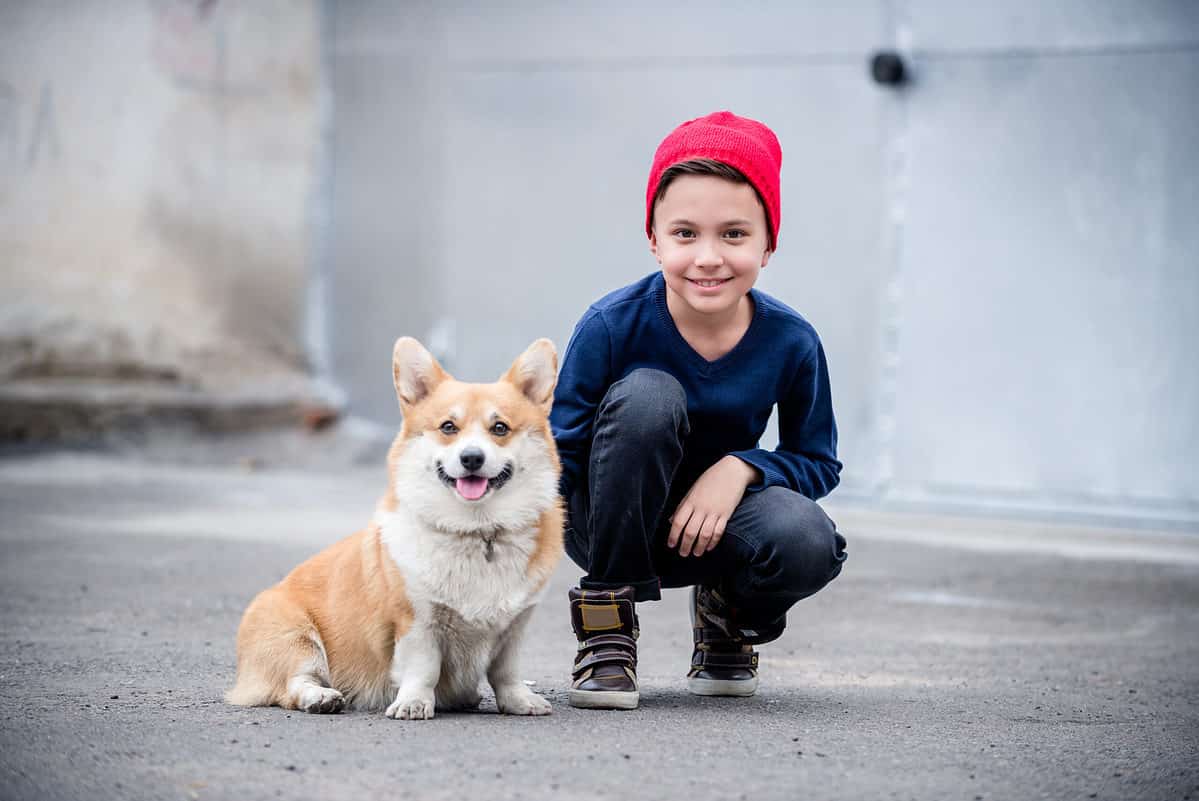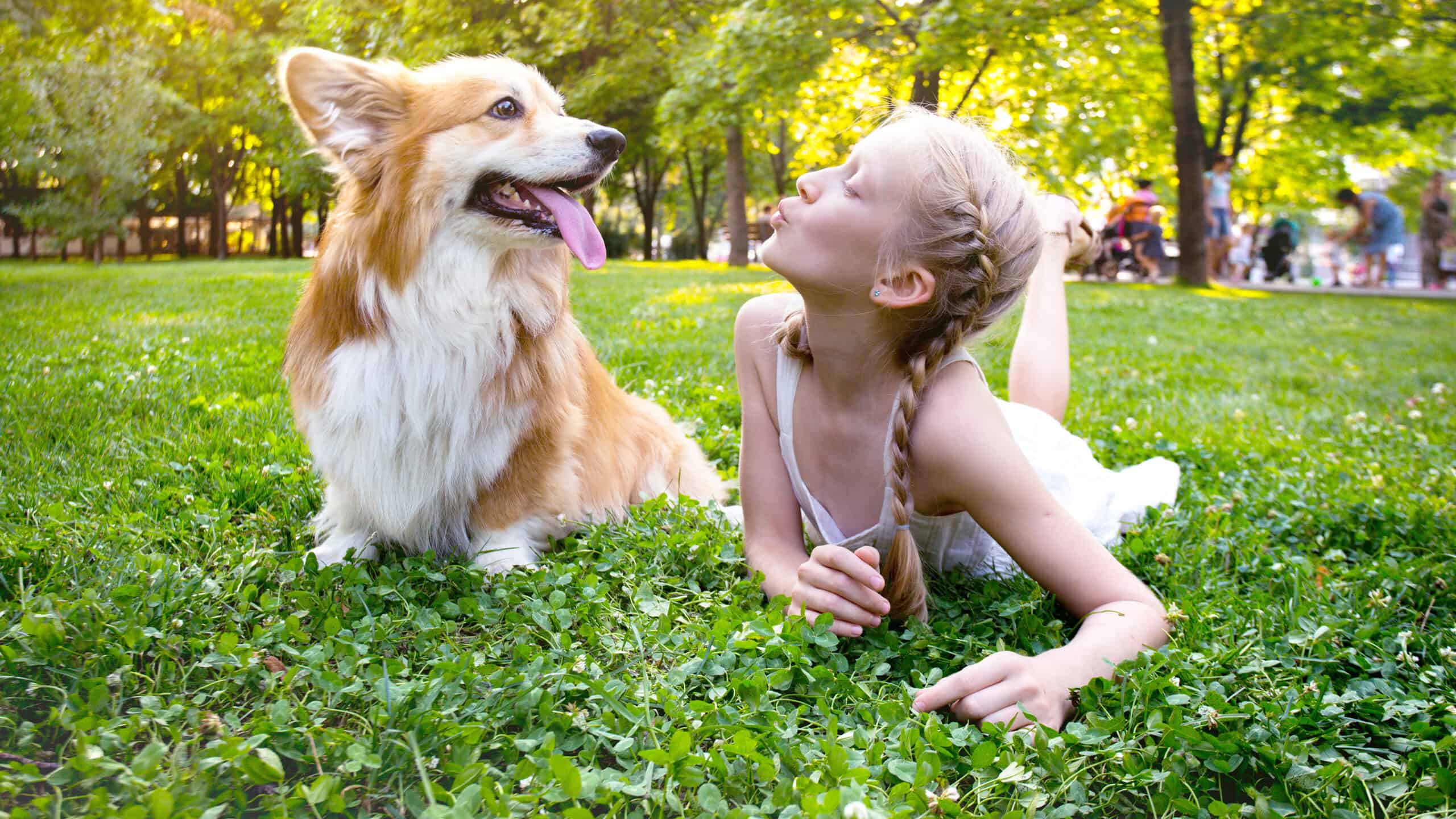Corgis are a miniature breed known for their hyperactivity and loud, boisterous bark. Their small size makes them very appealing to families with children. It's important to always do your research before adopting a dog of any breed. So if you are asking, are corgis good with kids? Then you have come to the right place!
Key Points
- Corgis are very playful and intelligent, but they are notably stubborn. This may make them difficult to train!
- Corgis are known to suffer from separation anxiety. A dog with separation anxiety can't handle being left alone for extended periods of time, and may engage in destructive or noisy behaviors if left alone.
- Corgis need a lot of grooming and exercise.
Corgis Have Earned the Nickname “Heelers” For a Good Reason!
Corgis are popular because of their small size and personalities. They are known to be hyper and energetic. However, with that excitability comes a touch of stubbornness.
Historically, corgis were bred for herding cattle. Their size was a contributing factor in how they were bred. The desire was to have a small dog that could nip at the cattle's heels but was loud enough to get the herd's attention. Mission accomplished, corgis are perfect herding dogs! They are a ball of energy and need plenty of exercise daily. They have an inherent desire to run, nip, and chase cattle, so it's no wonder they are an enthusiastic breed.
Corgis weigh, on average, between 20 and 30 pounds. They will reach up to 10 to 12 inches tall. Corgis may be small in stature, but their bark makes up for anything they lack in size! They have a very persistent and loud bark. Their bark is a great attribute regarding their original breeding purposes. Herding cattle meant they needed to be able to get the attention of the herd. Feeling the corgi at their heels and hearing the constant bark got the job done.
Corgis are now more popular family and house dogs. But where does this leave the inherent desire to run, nip, and bark? Well, they still have it! These traits are a part of their DNA and are very important factors to consider when adding a corgi to your family.
Corgi Personality and Temperament
Corgis are very playful. They love attention. They also love to be the center of attention. As a result, your corgi may experience intense separation anxiety. They do not like to be left alone for long periods, and this may lead them to feel a lot of stress. In addition, leaving your corgi alone for any extended amount of time may lead them to participate in unwanted behavior, like tearing up your pillows or getting into the trash.
Their strong desire for attention and vulnerability to separation anxiety means a corgi needs a family capable of giving it the attention it desires and needs.
It's hard for corgis to be told what to do despite their bossy personalities, nipping, and barking! They like to be the ones who are in charge. Their stubbornness can present a challenge when training your corgi.
Despite being stubborn, corgis are one of the most intelligent dogs around. Training them is possible if you can get past their stubborn streak with plenty of patience. Corgis are also very adaptable and can integrate themselves into their owners' lives well. Their adaptability makes owning a corgi ideal for many people in different living circumstances, such as a single person in the city or a family who lives in the countryside.

Corgis are high-energy dogs who are great for families with older children.
©Yana Kiselyova/Shutterstock.com
What a Corgi Needs
Corgis tend to be a higher-maintenance breed. Therefore, taking care of one will require you to be able to give them plenty of what they need. Their needs include grooming maintenance, exercise, attention, and mental stimulation. Let's go into depth below.
Corgis need plenty of grooming maintenance. They have a double coat, benefiting the corgi because it keeps them warmer, which they needed when they were initially bred. However, a double coat leads to more shed-ability. You will need to brush your corgi at least once a week, maybe even more. Bathing your corgi once a week would also be helpful to keep their coats from getting matted and dull.
Corgis need a ton of exercise. They are full of liveliness! If they do not get daily exercise, your pet may exhibit unwanted behavior.
Corgis are highly intelligent dogs, which means they need plenty of mental stimulation. Unfortunately, being bored can also lead to undesirable behavior. You can keep this behavior at bay by giving your corgi plenty of activities to stimulate its mind and keep it busy. Attention is another thing your corgi needs, and plenty of it! They love to be the center of your world.
Corgi Health Concerns
Corgis are a very healthy breed with very few health problems. However, Like all breeds, corgis also have a few health concerns to keep your eye on.
Hip Dysplasia
Corgis can be prone to hip dysplasia. This is because the corgi breed has dwarfism. They were intentionally bred to have tiny legs and normal-sized dog bodies, which has led to corgis having issues with their joints. Hip dysplasia is when the hip joint does not form properly, leading to rubbing in the hip socket incorrectly. Hip dysplasia is genetic, meaning if your corgis' parents had it, there's a higher chance they will get it. You should watch for hip dysplasia in your dog if they inherited the predisposition to develop it as they age.
Symptoms
- Weakness in hind legs, both or just one
- Bunny hopping
- Swaying gait
- Clicking sound coming from your corgi while they walk
- Behavior change- less energetic, no longer wants to run, play, etc.
Treatment
- Anti-inflammatory medicine
- Pain Medicine
- Exercise
- Physiotherapy
- Joint supplements
Progressive Retinal Atrophy
Progressive Retinal Atrophy is a term used to describe inherited retinal diseases that cause a dog to go blind. These diseases are hereditary. When a dog is born with this disease, it causes the rods in its eyes to not develop correctly. This inherited gene can also make your corgi prone to developing Atrophy later in life.
Symptoms
- Unwillingness to enter a dark room or go outside in the dark
- Dilated pupils
- Clumsiness
- Bumping into tables or doors
Treatment
There is no cure or treatment for Progressive Retinal Atrophy. If your corgi develops it, it will go blind. The best thing you can do for your dog is to make them comfortable and keep the same routine you always had. This will make the transition to complete blindness easier for you and your corgi.
Degenerative Myelopathy
This disease is progressive and affects the nerves in your corgis' spinal cord. As a result, they will lose feeling and control of their limbs. Although it sounds scary and painful, if your corgi has this disease, it will not be in any pain.
Symptoms
- Stepping on their knuckles instead of their paws
- Swaying hind legs
- Falling down
- Inability to get up
- Complete paralysis
Treatment
Unfortunately, there are no treatments for this disease because it leads to complete paralysis.
These are just a few diseases that corgis are more prone to develop, which does not mean they will. However, Corgis are a pretty healthy breed; their life span is between 12 and 15 years. The good news is that most of the diseases corgis are prone to getting are hereditary, meaning it's possible to try and screen for them before choosing to adopt a corgi.
Corgis and Allergies
Corgis can develop skin allergies because of their double coat. Therefore, keeping their coat clean and maintained to combat allergies is key. Although not typical, they may also be born with inherited food allergies. These food allergies include meat, soy, dairy, eggs, and grains. Keep an eye out for any reaction when introducing new foods to your corgi.
Corgis are not hypoallergenic. Their double coat means they shed all the time. A corgi may not be a great fit if you or your child has pet dander or hair allergies.
Cost and Maintenance
If you are considering adopting a corgi, it is important to think about the cost involved. Here are a few things to consider:
- Adopting a purebred corgi from a breeder can cost anywhere from $1,000-$3,500. Many factors go into the cost of adoption. These factors include the age, appearance, and bloodline of the corgi. The breeder's reputation and whether they screen for health issues are also determining factors.
- Initial vet visits and yearly vet visits.
- Medical expenses include vaccinations and whether or not you will have your corgi spayed or neutered.
- Grooming essentials can cost anywhere from $30 to $150, depending on your choice.
- Obedience and training schools are a cost to consider.
- Food expenses. Depending on the food you feed your corgi, monthly costs can range from $30 to $100.
- Miscellaneous costs are also important to consider.
Training Your Corgi
When you adopt a corgi, it is important to socialize and expose it to its new environment at a very young age. Unfortunately, corgis have a stubborn streak, which can make training them very difficult and requires a lot of patience. However, socialization training is possible if you constantly introduce your corgi to all the family members, including other animals, and get it acclimated to its environment very early!
It is also important to start training and grooming your corgi while it is still a puppy. The earlier it gets used to being groomed, the easier it will be for you as its owner.
Corgis respond best to positive reinforcement. They do not take well to being bossed around, so training will take time and patience. Positive reinforcement can make training feel less like a burden and more fun. Negative behavior may result from a lack of exercise or mental stimulation. Therefore, behavior and obedience training for your corgi may be worth considering. This can allow your corgi to be trained without you feeling stressed because of the time it takes.
Are Corgis and Children a Good Match?
Corgis are cute and lovable dogs. Their energy and hyperactivity may make them seem the perfect fit for a family with young children. However, adding a corgi to your family is not recommended if you have children under the age of five. Corgis have an ingrained desire to herd. They will herd their families if they do not have anything else to focus their energy on. As a result, a corgi may see an infant or young child as cattle that need to be herded and start to nip at your child to do so. This tendency may scare young children or put them in a position where they are accidentally hurt by a well-meaning corgi. Even though corgis aren't aggressive dogs who want to hurt someone, their energy may feel aggressive because of their urge to nip and herd.
Corgis are also loud and excessive barkers. This can pose a problem for parents with young infants and toddlers because it will disrupt naptime. Their loud barks may also scare young or sensitive children.
Corgis can be an excellent addition to families with older children who are responsible and can respect your corgi and its space. In addition, Corgis are great for families who spend a lot of time outdoors and can give them plenty of exercise time and fresh air.

Corgis love being the center of attention and are loyal to their families!
©Nadezhda V. Kulagina/Shutterstock.com
Raising Kids Around a Corgi
Raising infants or children under five around a corgi is not recommended. However, if you adopt a corgi and have older children, they make excellent family pets with proper obedience and socialization training. A corgi's innate nature will make them want to chase, herd, and nip children. They are not trying to be mean; they view young children as cattle that must be herded. You must prioritize training your corgi to listen to your children and you. Once trained, Corgis make wonderful playmates for children because they can match each other's energy levels!
Corgis can also be loving and loyal dogs who are protective of their families. These are great traits to look for when adding a dog to your family. A corgi can be raised around an older child with proper training. Just be sure to always supervise your child and corgi until you feel comfortable that they both can respect one another. If you do not believe this can be done, always supervise when your child and corgi are together.
Teach Your Child to Respect Your Corgi
Not only do you need to train your corgi to respect your child, but you also need to train your child to respect your corgi. Corgis do not tolerate being handled roughly. They will defend themselves, which may lead to them accidentally hurting a child. This is why teaching your child to be respectful and gentle to your corgi is necessary.
These respect rules are great for all dogs, not just pets! Here are a few ways to teach your child to respect their corgi (and other dogs!):
- Always be gentle.
- Do not get in a dog's face; this can scare them!
- Do not pull at their ears, tails (if they have one), or bodies. Even if your child is playing, your dog may feel threatened.
- Do not attempt to ride on your corgi or any dog in general.
- Always be respectful of dogs. Give your corgi space while they are eating, sleeping, etc. Don't startle a dog while they are sleeping, as this may cause even a gentle dog to growl or bite.
- Get your child involved in grooming and training your corgi. This can help your dog and child to bond.
- Teach your child to lead by example regarding pets, and to teach younger siblings to do the same.
Are There Any Breeds That Are Better Around Babies and Young Children?
A corgi is not the best choice if you have an infant or young child. But if you still want to adopt a dog at this time, consider these other breeds:
- Golden retriever. These dogs are known to be extremely gentle, loyal, and great family dogs.
- Beagle. Beagles are energetic and may get into trouble around the yard, but they're great with kids.
- Newfoundland. Although large, these dogs are basically gentle giants. They have a calm demeanor and are great with young kids.
- Labrador retriever. This breed is extremely popular with families, and for good reason. They're active, friendly, and very loyal.
Exercising Your Corgi
Corgis are hyperactive dogs who need a ton of exercise! They become excited very quickly. It is recommended that corgis get at least one hour of exercise daily, but if you can give them more, that is great! Remember, corgis have little legs. They will not be able to keep up with a bike or anything faster than they can run. It may just stress them out!
Here are a few ideas for exercising your corgi:
- Running
- Walking
- Herding balls
- Playing Fetch
- Swim
- Hide and Seek
Corgis love to eat! Their love to indulge can make them prone to becoming overweight without proper exercise. That is why getting your pet out of the house is very important. Remember to keep your corgi hydrated and cool; they have that double coat, after all!

Corgis are a ball of energy. This means they need plenty of exercise daily!
©Kseniia Grigoreva Russia/Shutterstock.com
Corgi History
Corgis have gained popularity in recent years because Queen Elizabeth II loved them! She owned over 30 corgis in her lifetime. Her love for them has made many people want to own one themselves. Corgis were originally bred as barnyard dogs to chase cattle. Their size was perfect for chasing cattle and nipping at their heels. This trait has earned them the nickname “heeler.”
We have yet to learn precisely when the corgi lineage started, and we may never know. However, it is believed to be around the 10th century. There are two purebred corgis: the Pembroke Welsh Corgi and the Cardigan Welsh Corgi. Cardigan Welsh Corgi lineage is older; however, Pembroke Welsh Corgis tend to be more popular among families. Both breeds are stunning and lovable dogs!
In Conclusion
So, do corgis and kids mix well together? If you have an older child, then yes! Corgis are great for families with older children who can be respectful of their pets. It is also important to remember that corgis require plenty of upkeep, maintenance, obedience, and socialization training. If you are a family with older children who can commit the time and attention a corgi requires, meet its maintenance needs, and teach your children to be gentle, a corgi may be perfect for your family!
The image featured at the top of this post is ©Mostovyi Sergii Igorevich/Shutterstock.com

